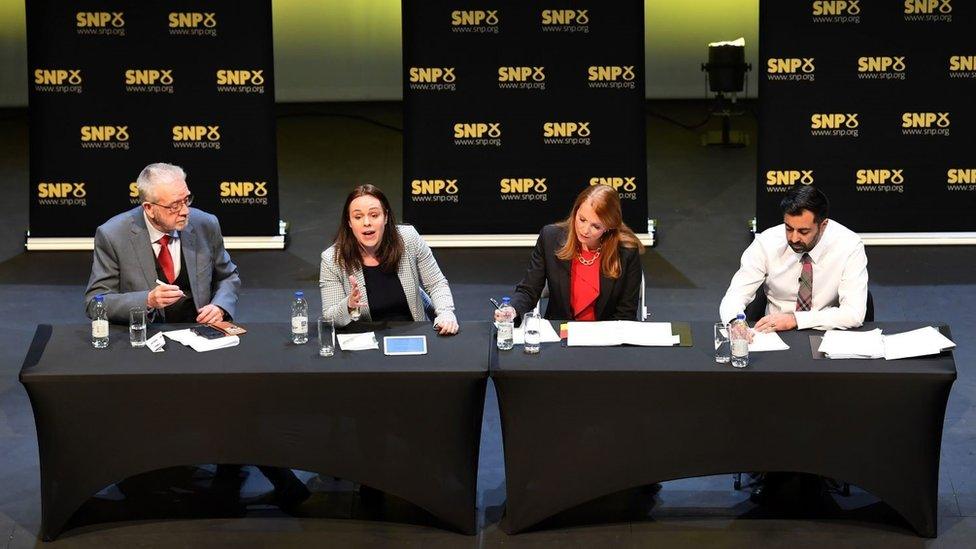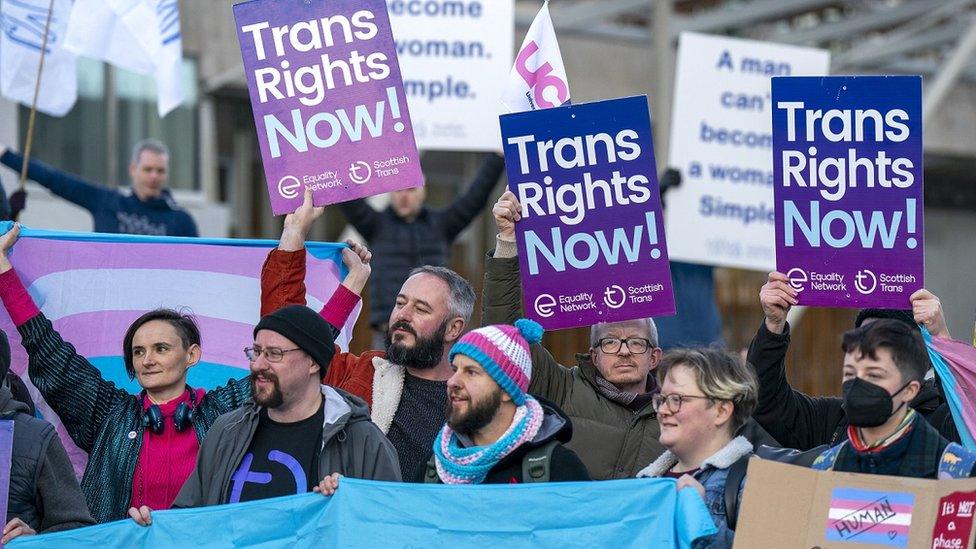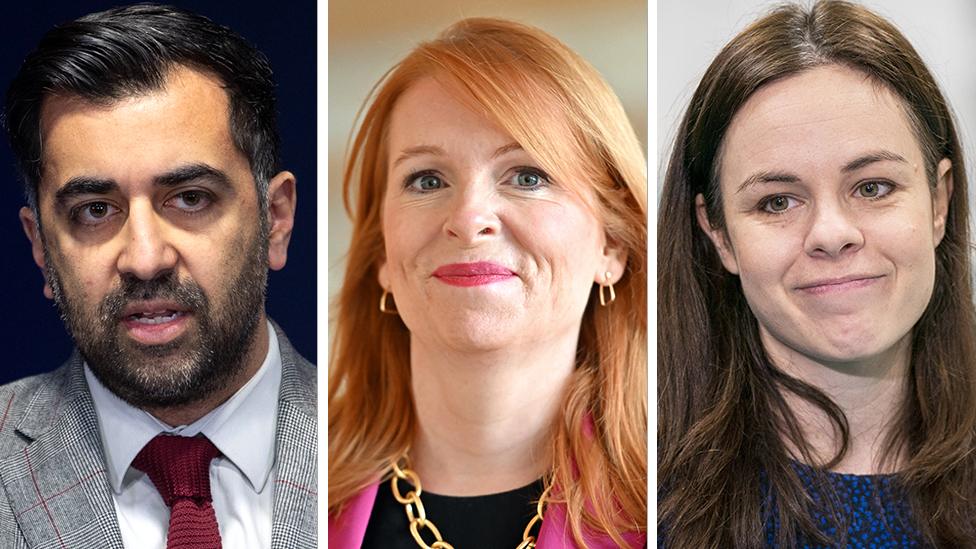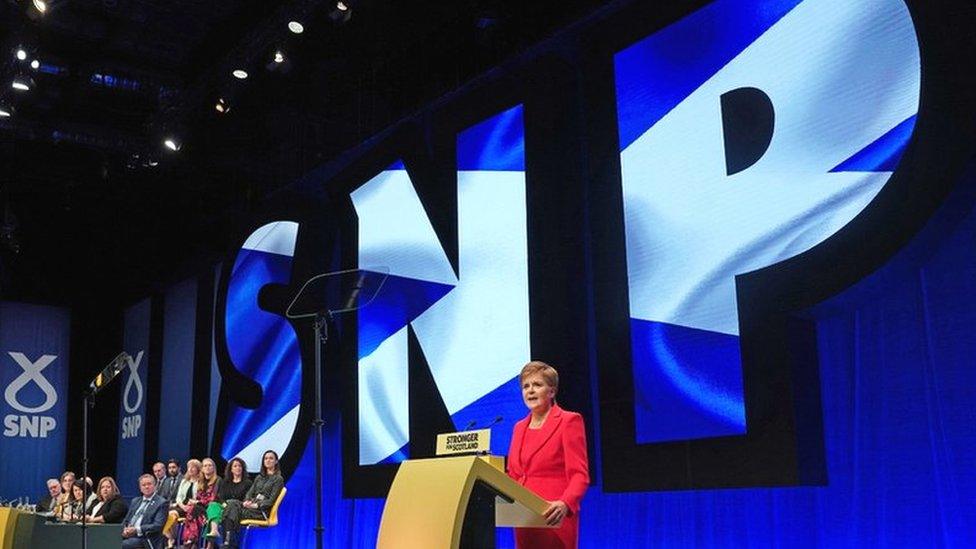SNP leadership: Candidates disagree on next step for gender bill
- Published

SNP president Mike Russell chaired the first leadership hustings in Cumbernauld with candidates Kate Forbes, Ash Regan and Humza Yousaf
The SNP leadership candidates have disagreed on how to deal with the bill designed to make it easier for people to change their legal gender.
Kate Forbes, Ash Regan and Humza Yousaf faced questions from party members at the first SNP leadership hustings.
The candidates had no common ground on plans for dealing with the UK government's block on the legislation.
But they all said independence was a priority, despite varying approaches on how to achieve it.
SNP members can vote for Nicola Sturgeon's successor from 13 March and the winner will be announced on 27 March.
During the debate at Cumbernauld Theatre in North Lanarkshire, all three contenders had some agreement on several issues including NHS reform, tackling the cost of living crisis and buffer zones around abortion clinics.
But it was gender reform laws that drew the most disagreement.
Last month Scottish Secretary Alister Jack used a Section 35 order to prevent the Gender Recognition Reform (GRR) Bill, external becoming law on grounds it would conflict with equality protections applying across Great Britain - a claim disputed by the Scottish government.

Mr Yousaf said Scotland "must challenge" the Section 35 order.
"In this room there is going to be a range of views on GRR, I accept that," he said, adding: "This is about the principle of our democracy."
The health secretary said the UK government would not stop at blocking one law, and the party had to be seen to be standing up for devolution if it was to be trusted with independence.
Ms Forbes said the Scottish Parliament had a responsibility to fix the controversial bill.
"One day we are going to be independent, and when we are independent we are going to have to sort these things out ourselves," the finance minister said.
"Yes, I would seek legal advice, but I'd far rather sort out the legislation ourselves rather than having to go to court or without having to seek Westminster's permission around what we do next."
Ms Regan, who resigned from the Scottish government over the proposed reforms, said the SNP had lost the trust of the public on this "divisive" issue.
She added: "I wouldn't challenge the Section 35, not because I think it is OK for the UK to challenge our legislation, but for the simple reason that we are going to lose that court case and we are going to be throwing probably hundreds of thousands of pounds of public money into something that the public don't support."
The former community safety minister, who resigned over the plans, said the issue could be addressed by a citizens' assembly, adding: "If I'm going to pick a fight with the UK government, I'm going to do it on something where the public are behind me."


It was a first chance for the leadership candidates to go head-to-head and most of the ground covered was familiar territory.
Humza Yousaf, Kate Forbes and Ash Regan set out competing approaches when it comes to the party's independence strategy, while their positions on issues like Holyrood's gender reform legislation also varied.
But while divisions were on show, the tone of the debate was respectful.
The candidates didn't directly challenge each other, and there was agreement on some issues - the need to reform the NHS, calls for a change in approach to local government and support for proposals for safe access zones around abortion clinics.
Perhaps most striking was the contrasting ways in which the candidates sought to frame themselves.
Humza Yousaf made frequent references to Nicola Sturgeon, and listed the Deputy First Minister John Swinney as one of his closest political friends - and there was talk of building on the SNP's legacy.
Ash Regan insists she's the candidate for change, and is pitching directly to the grassroots who are impatient for independence.
Kate Forbes also wants this contest to be about leaving the UK, but she's focused on the substance of the case rather than the route to getting there.

On independence, all three reiterated their commitment to the cause but favoured different routes to achieve it.
Mr Yousaf said he was not wedded to a de facto referendum, adding that regional assemblies could be utilised to come up with solutions.
He said: "[Nicola Sturgeon] is by a country mile the smartest person I know. If there was a quick way of getting our independence, trust me, Nicola absolutely would have found it."
Ms Regan called for every vote to be used as a measure of Scotland's desire for ending the union because the UK strategy was to "stop Scotland expressing its will".
She said: "I will exert maximum pressure to get the UK government to come to the table to negotiate."
Ms Forbes called for "maximising support" for independence, not just aiming for 51% of the country being in favour of it.
She said she would do this by displaying competent governance, growing the economy, eradicating poverty and "demonstrating that Scotland's better days are ahead with independence and not without".
Windsor Framework
Northern Ireland's deal on access to the EU single market was also broached.
The Windsor Framework - struck this week - removes the protocol's barriers on trade across the Irish Sea and hands a "veto" to politicians in Stormont on EU law, a set of concessions from Brussels that went further than many expected.
Mr Yousaf said Scotland should "demand" access to the EU single market after Rishi Sunak's new deal.
He also said the party should make sure clips of the prime minister "extolling the virtues of the deal" are broadcast "in every single living room" in Scotland because it "makes the argument for us."
Ms Forbes said the deal demonstrated the value of being part of the world's largest single market, adding: "If Northern Ireland can do it, why can't Scotland?"
Ms Regan said she believed Scotland should consider joining the European Free Trade Association as a precursor to rejoining the EU if Scotland becomes independent, a position closely aligned to that held by Alex Salmond's Alba Party.
Faith in politics
The candidates also touched on the role of faith in politics, agreeing that a person of faith should not be prevented from leading a pluralistic society.
Mr Yousaf confirmed that as a "proud Muslim" he would be observing Ramadan fasts by the end of the leadership contest, but said his faith had not been the "basis of policy" in his role as a legislator.
Ms Forbes, who faced criticism about her Christian beliefs last week, said: "I hope that I can defend your right to the hilt to have faith or no faith."
Nine similar hustings are planned before the ballot, which will use a single transferrable vote system. One debate will be held online.
The SNP was accused of infringing press freedoms by initially blocking media access to its leadership hustings, but later agreed to allow limited media access.
- Published1 March 2023

- Published25 February 2023

- Published24 February 2023
